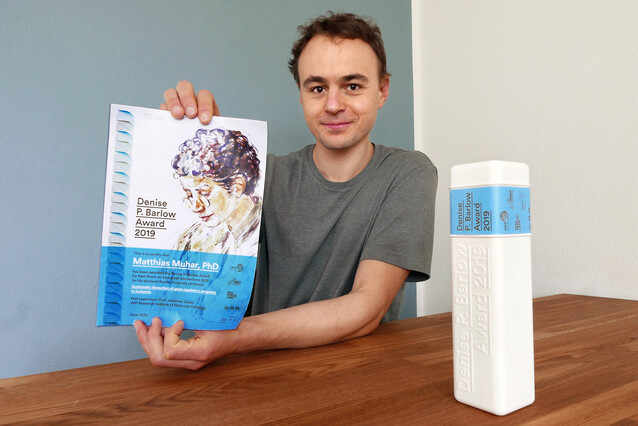Denise P. Barlow Award for Matthias Muhar
Matthias Muhar, IMP alumnus from the lab of Johannes Zuber and now postdoc at the ETH Zurich, received the Denise P. Barlow Award 2019 in recognition of his doctoral studies. In his PhD project, Matthias addressed this fundamental challenge by combining CRISPR genome engineering, targeted protein degradation, and SLAM-seq.
SLAM-seq is a method that had been developed by the group of Stefan Ameres at the Institute of Molecular Biotechnology of the Austrian Academy of Sciences (IMBA) around the time when Matthias started his doctoral project. Using the then new method, he was able to define the regulatory functions of two important transcriptional hubs in cancer, BRD4 and MYC, which had long evaded a definitive experimental characterization. The project not only identified direct targets of BRD4 and MYC, but also elucidated the underlying mechanism of an emerging therapeutic concept: treatment with BET bromodomain inhibitors (BETis). The main publication rising from Matthias’ project, “SLAM-seq defines direct gene-regulatory functions of the BRD4-MYC axis”, was published in the journal Science in May 2018. For his studies, Matthias was also presented with the Lauwers Award 2017, the Vienna BioCenter PhD Award 2018, and ÖGBMT Award 2018.
Matthias studied biology at the University of Vienna. After obtaining his Master’s degree in 2014, he joined the lab of Johannes Zuber through the Vienna BioCenter PhD-Program. He is currently a postdoctoral researcher in the lab of Jacob Corn (ETH Zurich).
The 2019 Barlow Award is shared between Matthias and Julia Batki, also an alumna of the Vienna BioCenter PhD Program. Working under the supervision of Julius Brennecke at IMBA, she studied the nuclear small RNA-guided silencing of transposable elements in the fruit fly Drosophila melanogaster. Julia Batki is currently a postdoc at the Max Planck Institute for Molecular Genetics in Berlin.
About the Denise P. Barlow Award
Denise Barlow had a prolific scientific career, mostly remembered for her contributions to early epigenetics. A detailed account of the work she had done while starting her lab at the IMP can be found on this website. Denise’s career, however, continued to span four institutions in Vienna: following the IMP, where she was a group leader, it also included the Max Perutz Labs, where she was a professor, IMBA, which provided laboratory space for some time, and CeMM, where she was a principal investigator until her retirement.
Following Barlow’s untimely passing in 2017, these four institutions launch an annual award in her name to merit exceptionally interesting PhD studies carried out in one of the four institutions. Specifically, the Denise P. Barlow Award intends to promote the academic career of young scientists, strategically addressing the transition of graduated PhD students to postdocs, by offering a small financial help that will alleviate the costs associated with relocation or career development.
The “Denise P. Barlow Award” amounts to 5,000 Euro. After two years of postdoc research, awardees are invited to give a talk, and while in Vienna, participate to the award of the next winner. The topic of the thesis can vary and cover basic cell biological, biochemical, molecular biological, structural and computational work, with an emphasis on insight on new biological mechanisms, something Denise P. Barlow was fond of. The award selection committee comprises seven people, including the four scientific directors of the awarding institutes. Due to the current pandemic, the 2019 award was announced with a delay.
